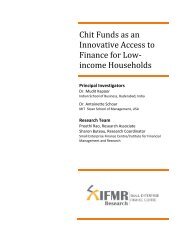Government of India Volume I: Analysis and Recommendations
Government of India Volume I: Analysis and Recommendations
Government of India Volume I: Analysis and Recommendations
You also want an ePaper? Increase the reach of your titles
YUMPU automatically turns print PDFs into web optimized ePapers that Google loves.
STRUCTURE OF THE REGULATOR<br />
Table <strong>of</strong> <strong>Recommendations</strong> 3.4 Appointment conditions for board members<br />
1. Duration <strong>of</strong> employment: All members <strong>of</strong> a board (including the chairperson) would have a fixed term <strong>of</strong> five<br />
years, subject to a retirement age for executive members. The age <strong>of</strong> retirement for executive members must<br />
be equivalent to the age <strong>of</strong> retirement for the equivalent senior-most <strong>Government</strong> positions.<br />
2. Protection <strong>of</strong> entitlements: The salaries <strong>and</strong> other entitlements <strong>of</strong> the members <strong>of</strong> the board should be fixed<br />
by the <strong>Government</strong>. However, once they are set, they should not be varied to the detriment <strong>of</strong> the incumbent<br />
members <strong>of</strong> the board, or require further approvals from the <strong>Government</strong>.<br />
3. Terms <strong>of</strong> removal: The draft Code provides for both, the reasons for which a member may be removed <strong>and</strong><br />
the process by which removal will take place. This may be done for:<br />
◮ Regular Reasons: Completion <strong>of</strong> term, reaching the prescribed age limit, declaration <strong>of</strong> insolvency<br />
<strong>and</strong> conviction by a criminal court which involves imprisonment.<br />
◮ Special Reasons: Incapacity (physical <strong>and</strong> mental), behaviour unbecoming <strong>of</strong> the position held, conviction<br />
by a criminal court which does not involve imprisonment <strong>and</strong> dereliction <strong>of</strong> duty. For removal<br />
under special reasons to take place the <strong>Government</strong> should establish a judicial committee (under the<br />
supervision <strong>of</strong> the Supreme Court), which will investigate whether removal is necessary on the suggested<br />
grounds <strong>and</strong> create a public report on the issue.<br />
4. Re-appointment: Members <strong>of</strong> the board can be reappointed for another term <strong>of</strong> five years as members. This<br />
provision will however not be available for the chairperson <strong>of</strong> the board who cannot be reappointed. There<br />
will be no automatic re-appointments - the incumbent member will be considered by the selection committee<br />
alongside other prospective c<strong>and</strong>idates. If the selection committee finds the member suitable, he/she will<br />
be short-listed <strong>and</strong> the <strong>Government</strong> then may choose to reappoint such members. The Commission believes<br />
that this will ensure that the tenure <strong>of</strong> members is not extended as matter <strong>of</strong> course.<br />
Table <strong>of</strong> <strong>Recommendations</strong> 3.5 Law governing board meetings<br />
The principles governing the following matters must be covered by the draft Code:<br />
1. Frequency <strong>of</strong> meetings;<br />
2. Quorum;<br />
3. Method <strong>of</strong> taking <strong>and</strong> recording decisions;<br />
4. Decisions without meetings;<br />
5. Legitimacy <strong>of</strong> decisions; <strong>and</strong><br />
6. Conflicts <strong>of</strong> interest.<br />
The Commission is <strong>of</strong> the view that very high regard should be given to the need for<br />
transparency in the board meetings <strong>of</strong> the regulator. While there may be some specific<br />
decisions or deliberations <strong>of</strong> the regulator which may have commercial implications <strong>and</strong><br />
may not be released immediately, this should not be unduly used as a reason to deviate<br />
from the general principle <strong>of</strong> transparency. The draft Code will therefore require the<br />
regulators to be transparent about meetings as far as possible <strong>and</strong> when any information<br />
is kept confidential, reasons for doing so must be recorded. For instance, pending<br />
investigations <strong>and</strong> queries about violations by a regulated entity should be kept outside<br />
the purview <strong>of</strong> publication as they have an impact on the reputation on the institution<br />
without a finding <strong>of</strong> violation <strong>of</strong> laws. However, the decisions <strong>of</strong> the regulator should be<br />
published to provide information to the regulated entities on the st<strong>and</strong>ards <strong>of</strong> conduct<br />
expected by the regulator.<br />
There is also a need for a formal mechanism to evaluate the regulator’s compliance<br />
systems. This will be achieved by setting up a review committee that will be comprised<br />
only <strong>of</strong> non-executive members <strong>of</strong> the board (see Table 3.6).<br />
3.4. Advisory councils <strong>of</strong> the regulator<br />
The regulators will be responsible for regulating a large <strong>and</strong> rapidly developing financial<br />
system in <strong>India</strong> consisting <strong>of</strong> a large number <strong>of</strong> stake-holders, including financial service<br />
providers, intermediaries, consumers <strong>and</strong> other users <strong>of</strong> the financial system. It is not<br />
possible to ensure that all these stake-holders are adequately represented at all times<br />
24 FINANCIAL SECTOR LEGISLATIVE REFORMS COMMISSION



